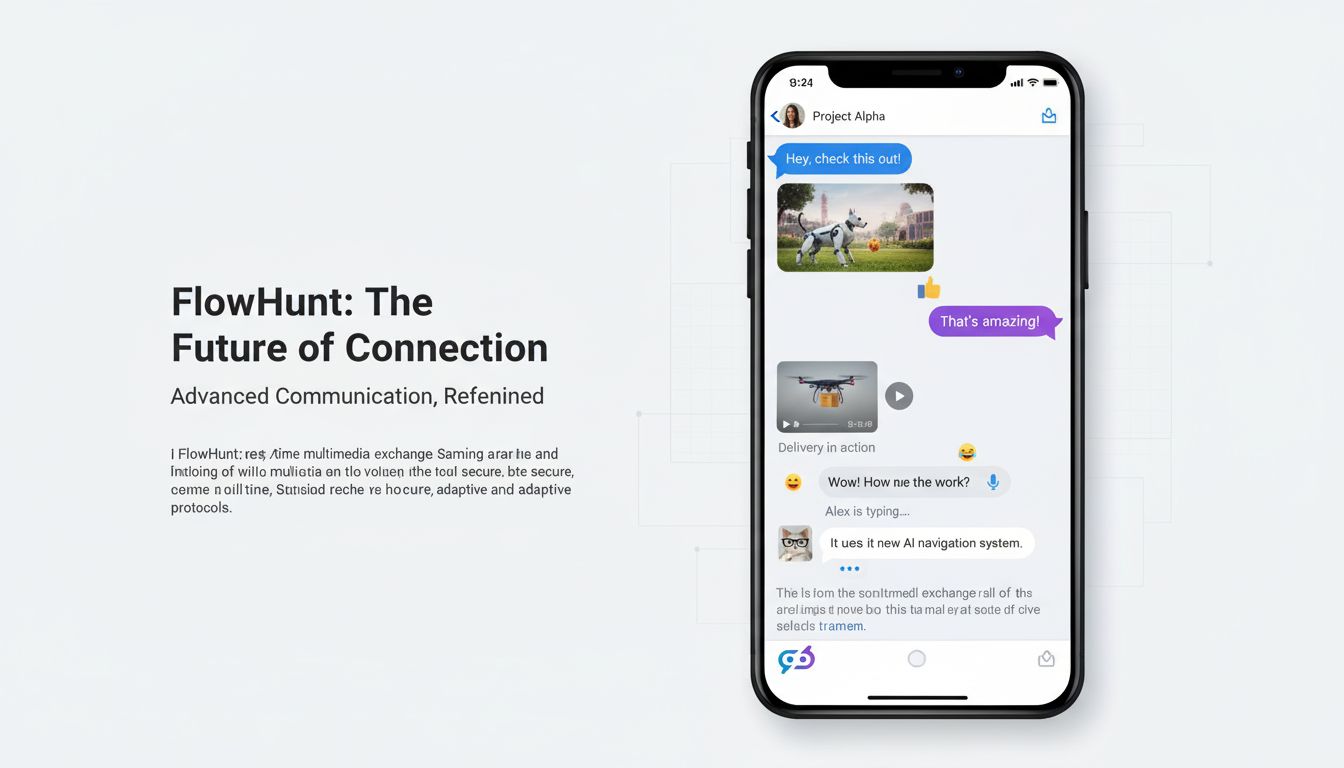
AI Assist: The Complete Guide to Modern AI Assistants
Discover everything you need to know about 'ai assist'—what it is, how it works, use cases, technology, security, and how to implement FlowHunt’s advanced AI as...

Discover what an AI email assistant is, how it works, key features, top tools, and how it transforms email productivity for professionals and businesses.
An AI email assistant is a productivity tool that uses artificial intelligence and natural language processing (NLP) to automate and optimize your entire email workflow. Unlike traditional email clients, which rely on manual sorting, reading, and responding, AI email assistants can intelligently draft messages, summarize long threads, categorize incoming emails, and even suggest replies—all tailored to your writing style and priorities. By deeply integrating with your inbox, these assistants learn from your communication patterns, making each interaction smarter and more personalized over time. Whether built directly into popular platforms like Gmail and Outlook or available as standalone apps, AI email assistants are rapidly becoming essential for professionals and organizations overwhelmed by the daily deluge of messages.
Despite the proliferation of instant messaging apps, collaboration platforms, and social media, email remains the backbone of business communication. Recent industry surveys indicate that over half of all client communications still happen via email—a testament to its reliability, formality, and universal reach. However, the volume and complexity of email have also grown, leading to inbox overload, missed follow-ups, and wasted hours spent on repetitive tasks. This is where AI email assistants offer a transformative leap: by automating routine actions and surfacing what matters most, they restore focus and efficiency in the digital workplace.
AI email assistants function by connecting to your email account (Gmail, Outlook, etc.) and applying advanced machine learning algorithms to your messages. Using natural language processing, they analyze the content, context, and sentiment of emails, enabling a range of intelligent features:
These capabilities are typically delivered via browser extensions, integrations with your email client, or as standalone apps with their own UI. The best assistants prioritize privacy and security, ensuring your data is handled responsibly.
The feature set of AI email assistants is continually evolving, but several core functions are becoming standard across top solutions:
AI email assistants don’t just produce generic replies—they can mimic your writing style and adapt to the context of each conversation. By referencing your historical emails, these tools ensure that drafted messages sound natural and relevant. For example, Microsoft Copilot for Outlook and Gemini for Gmail both use large language models to create context-aware responses, reducing the time you spend writing and editing.
Advanced assistants can automatically categorize emails by topic, urgency, or relationship. Features like “priority inbox,” AI-powered folders, and custom tags help users focus on what’s important. Tools such as SaneBox and Notion Mail excel at filtering out distractions and surfacing high-value conversations.
Missing a critical follow-up can cost deals or damage relationships. AI email assistants can track outstanding replies, suggest reminders, and even trigger automated follow-ups based on recipient engagement or your preset rules.
Instead of wading through endless threads, AI assistants can provide concise summaries or pull out actionable items from email chains. They also enable smarter search, letting you use everyday language to find what you need quickly.
With sensitive business information often exchanged via email, privacy is crucial. Leading AI email assistants implement strong encryption, local data processing, and compliance with privacy regulations. Some, like Proton Scribe, emphasize privacy-first approaches for highly regulated industries.
Experience the power of intelligent email automation with FlowHunt's AI Email Assistant. Automate responses, prioritize messages, extract key information, and integrate seamlessly with your existing workflow. Save hours every week while improving communication quality.
The adoption of AI email assistants yields tangible benefits for both individuals and organizations:
A practical example: A sales manager using an AI assistant can have all incoming leads automatically categorized, receive suggested draft responses, and get follow-up reminders for prospects who haven’t replied within a set time. This not only increases conversion rates but also allows the manager to focus on relationship-building rather than administrative overhead.
AI email assistants are versatile and can be tailored to a variety of professional scenarios:
The landscape of AI email assistants is rapidly evolving. Here are some of the standout tools, each with unique strengths:
Each of these tools has its own pricing, integrations, and unique features. When selecting an AI email assistant, consider your platform (Gmail, Outlook, etc.), desired features, privacy requirements, and budget.
The business case for adopting AI email assistants is compelling. Organizations face mounting pressure to do more with less—tighter timelines, higher volumes of communication, and rising client expectations. AI email assistants offer a way to automate low-value work, improve accuracy, and empower employees to focus on strategic initiatives. For individuals, the benefits are just as clear: less time in your inbox, more time on meaningful work, and a better balance between responsiveness and well-being.
AI email assistants are not just a trend—they are a fundamental shift in how we manage communication in the digital age. By leveraging the latest advancements in artificial intelligence, these tools turn a once overwhelming inbox into a streamlined, intelligent workspace. Whether you’re a solo entrepreneur or a global enterprise, integrating an AI email assistant can unlock new levels of productivity, security, and professional polish. As the technology continues to mature, expect even more seamless automation, deeper personalization, and smarter collaboration features on the horizon.
Summary:
AI email assistants use artificial intelligence to automate and enhance every aspect of email management, from drafting and organizing to follow-ups and security. With leading solutions now capable of mimicking your tone, surfacing what matters most, and protecting your inbox, adopting an AI email assistant is one of the smartest moves for boosting productivity and staying ahead in today’s fast-moving business world.
An AI email assistant is a tool powered by artificial intelligence and natural language processing that helps users automate, organize, and optimize their email management. It can draft, summarize, sort, and respond to emails autonomously or with minimal human intervention.
They reduce manual tasks such as sorting, replying, and following up on emails, saving time and decreasing cognitive load. Features like smart inbox filtering, automated drafting, and reminders help users focus on high-priority messages and tasks.
Most reputable AI email assistants use encryption and comply with privacy regulations. Some, like Proton Scribe, are designed with privacy-first principles. Always review a tool’s privacy policy before connecting your inbox.
Popular options include Shortwave, Microsoft Copilot for Outlook, Gemini for Gmail, Superhuman, SaneBox, Proton Scribe, and Edison Mail. Each tool offers unique features such as advanced drafting, smart filtering, or enhanced privacy.
Yasha is a talented software developer specializing in Python, Java, and machine learning. Yasha writes technical articles on AI, prompt engineering, and chatbot development.

See how FlowHunt’s AI-powered workflow automation can elevate your email efficiency, streamline your communications, and help you focus on what truly matters.

Discover everything you need to know about 'ai assist'—what it is, how it works, use cases, technology, security, and how to implement FlowHunt’s advanced AI as...

Automate Gmail inbox management with an AI agent that reads incoming emails, leverages your knowledge base to craft professional replies, and can send, label, o...

Explore what an AI contact center is, its benefits, real-world use cases, deployment steps, and how FlowHunt helps organizations deliver automated, efficient cu...